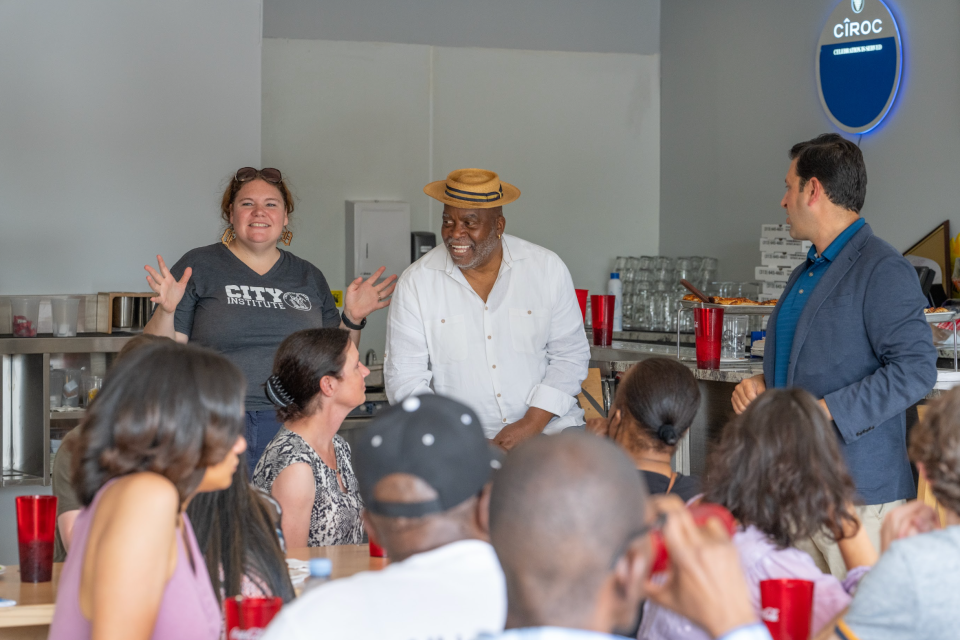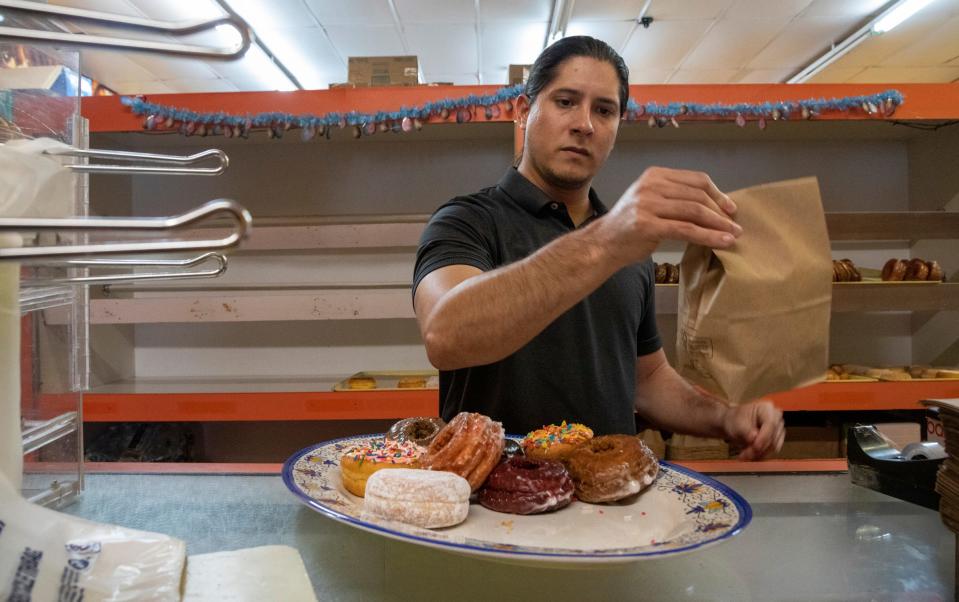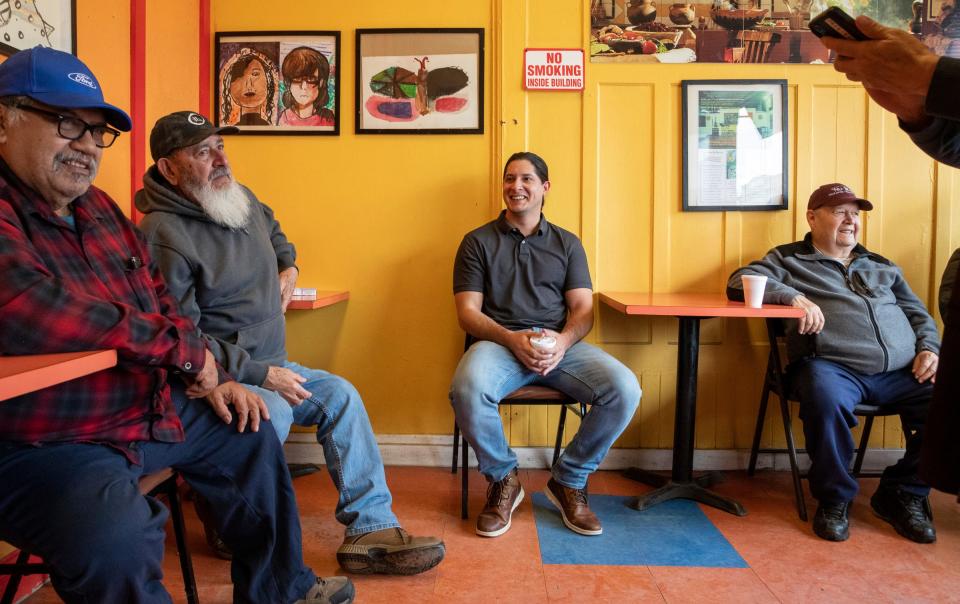Rubin: This tour of the real Detroit has art and donuts — but no gyros
Jeanette Pierce is leading her annual tour of Detroit next week, the only wide-ranging excursion all year that's open to whoever feels like buying a ticket. The bus is guaranteed not to stop at Greektown, that block of Mexican restaurants on Bagley Street or the corner where the Tigers used to play.
One other absolute: You'll get a first-rate pastry from Donut Villa, and some hard-won insight from people who see more of the city than the parts that feel like a theme park.
Pierce, 42, is the founder of City Institute and the genial host of the Detroit in Context Learning Journey, an all-day adventure April 6 that should be lots more enjoyable and lots less like homework than the name suggests.

She's a Detroit native who moved downtown 20 years ago and says she basically hasn't driven to work since. These days she lives in Lafayette Park with her husband, 4-year-old triplets and a fierce desire to expose everyone, Detroiters included, to the parts and the truths of the city they're probably not aware of.
"We’re all creatures of habit," she says. "We stay in our neighborhoods, our side of town. There's always more to learn no matter how long you've lived here or how much you know."
There's a spot on East Warren, for instance, called the ZAB Cultural Collective that's an artist-run gallery, studio and co-working center. It's on the east-side swing of the Learning Journey, after breakfast and before lunch at the Detroit Pizza Bar and trips to the west and southwest slices of the city.
ZAB's Denise Moore once told Pierce that there was nothing noteworthy about her or her business. Then she mentioned that she and her husband bought their building at auction and when they tried to let themselves in, a street gang told them, “This is our building, and you need to go away.”
Moore and spouse absented themselves for a large part of two decades. You could take that as a Detroit horror story, or you could take it as a study of patience, planning and perseverance that produced a great place to hang out or make art.
Pierce leans more toward Option B. It's a resilient city, she says, and experience suggests that progress moves on uneven schedules.
Among the other things she has discovered across years of exploring and actually talking to people and asking questions: Everyone has a story, every city can use someone like her, and she shouldn't drink coffee.
"No caffeine," she says. "I'm not allowed to have caffeine and talk about Detroit. It scares people."
From Derderians to donuts
Getting back to City Institute, Pierce launched an earlier version of it in January 2006 when she realized how many things she didn’t know about Detroit and the people who live there. She’d walk into someplace as well known as the Anchor Bar and walk out wanting to tell everyone that it was three generations deep into Derderians at the tap, and that newspaper reporters used to cash their paychecks in the till to pay off their tabs.
“Part of the reason I started the organization,” she concedes, “is that my friends were like, ‘Shut up. I don’t care.’”
It turns out that lots of other people do, and the more aware people are of what’s around them, the theory goes, the closer Detroit comes to being a place that prospers for everyone.
City Institute mostly offers targeted tours for companies and universities that might be trying to recruit, retain or simply educate. Far beyond Eight Mile Road, she has been paid to speak in places like Portland, Oregon, on the value of grass-roots tourism.
Next week, she'll roll down W. Vernor Highway to the temporary version of Donut Villa, which is sharing space with a flour tortilla manufacturer while its long-standing shop is being renovated. Owner Gabriel Gutierrez, 30, bought the Villa five years ago, and Pierce will ask him to talk to her group about the challenges of running a small business in a part of Detroit that has managed to thrive for 40 years even as other areas withered.

Southwest Detroit is "severely under-banked," says Gutierrez, whose degree from Miami University is in finance. He tells of hearing a credit union executive preen over recent a $1.2 million loan in Oakland County and asking him what was the biggest deal he's written in Gutierrez's neighborhood.
The answer was $200,000, a number that rankles him, and will surely resonate with Pierce.
The Donut Villa used to be a depot for day laborers. Now, he says, labor is in such high demand that the former piecemeal workers are scheduling jobs weeks ahead.

"It's a story of American success," he says — and again, something Pierce will remember.
"She's impassioned," Gutierrez says of Pierce, and motivated by every new story she hears.
A few words about Greektown
The Learning Journey starts at 8 a.m., with Lex Zavala of the Detroit Hispanic Development Corp. the last scheduled speaker at 4:30 p.m. It's not cheap — tickets are $125 at thecityinstitute.com — and not routine.
"We connect the dots between these speakers, these stops and these neighborhoods," Pierce says. And, OK, you want to learn a little about Greektown?
"It's funny," she says. "Even though everybody's been there, people don't know that place, either."
The Golden Fleece is the last of the mom-and-pops left over from the days when actual old Greek men would play inscrutable card games in backrooms and drink sludge-thick coffee from tiny cups. That would be on her tour.
Operators have told her Greektown is rowing against the tide of trendiness, she says, "because everyone is going to these hot new places." That would definitely come up.
What's now Greektown was originally German. The Second Baptist Church on Monroe Street was founded by 13 former slaves who'd become disenchanted with the First Baptist Church, and it was the gateway to Canada for 5,000 people on the Underground Railroad.
Pierce likes to look further and dive deeper, away from the places with brochures at the airport. But there's value everywhere, she says, past and present, because how do you know what you need unless you know what you have?
Neal Rubin's favorite restaurant in Greektown was Ethiopian, but he also misses Cyprus Taverna. Reach him at NARubin@freepress.com, or on Twitter at @nealrubin_fp.
To subscribe to the Free Press for less than bus fare, click here.
This article originally appeared on Detroit Free Press: Rubin: A tour of the real Detroit with art and donuts — but no gyros

